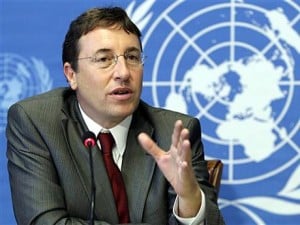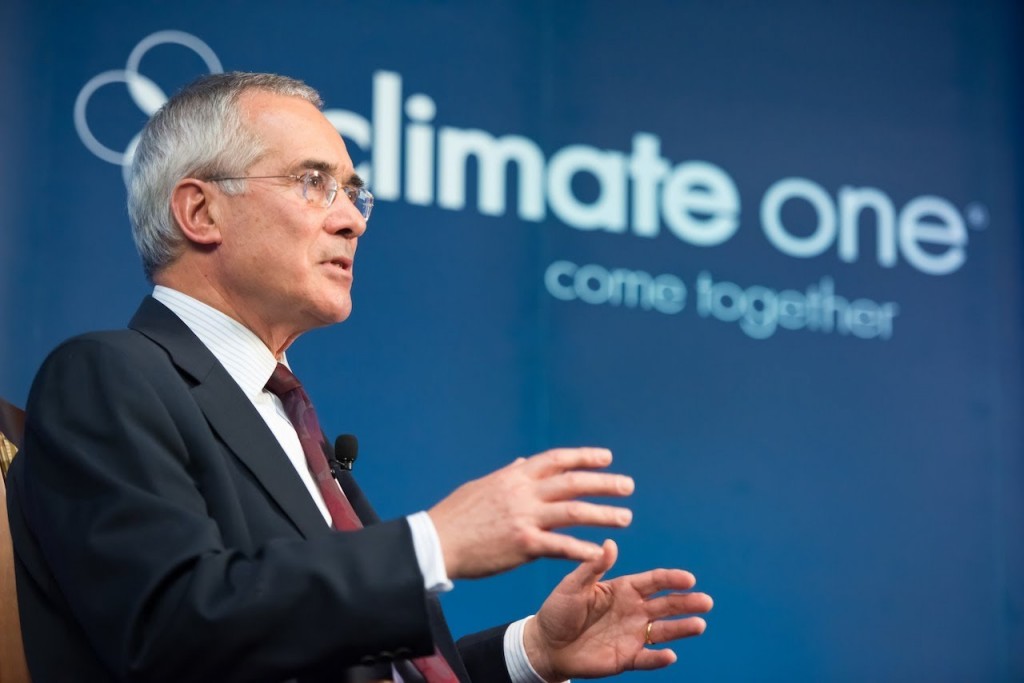Kumi Naidoo, Executive Director, Greenpeace International:
The wheel of climate action turns slowly, but in Paris it has turned. This deal puts the fossil fuel industry on the wrong side of history.
“There’s much in the text that has been diluted and polluted by the people who despoil our planet, but it contains a new imperative to limit temperature rises to 1.5 degrees. That single number, and the new goal of net zero emissions by the second half of this century, will cause consternation in the boardrooms of coal companies and the palaces of oil-exporting states.
“Now comes the great task of this century. How do we meet this new goal? The measures outlined in Paris simply do not get us there. We have a 1.5 degree wall to climb, but the ladder isn’t long enough. The emissions targets on the table aren’t big enough, and the deal doesn’t do enough to change that. The new goal of net zero greenhouse gas emissions by the second half of the century effectively means we need to phase out fossil fuels – the easiest to cut – by 2050.
Grassroots Global Justice Alliance
As impacted communities, we are deeply aware of the imperative of the climate crisis. Our waters are being poisoned from fossil fuel extraction, our livelihoods are threatened by floods and drought, our communities are the hardest hit and the least protected in extreme weather events. The climate crisis is a reality, but the COP21 Paris Accord is not based on that reality.
The atmosphere within the COP21 meeting was one of business instead of saving Mother Earth. World leaders were in deep negotiations not over climate policy, they were in negotiations about commercialization of nature. The result is a Paris Accord that is based on a carbon market that allows developed countries to continue to emit dangerously high levels of greenhouse gasses through shell games, imaginary technofixes, and pollution trading schemes that simultaneously let big polluters to continue polluting and result in land grabs and violations of human rights and the rights of Indigenous Peoples.
When Obama says we are doing out best, it is simply not true. From cap and trade in California, to the carbon trading requirements of the Clean Power Plan, the US came into Paris with a predetermined model based on false solutions and bullied other countries to jump on board. The commitments they made ignore the overwhelming historic responsibility as a leader greenhouse gas emitter, and are far too low to stop the burning of the planet.
The COP21 agreement is a failure, condemning humanity to a slow and painful death. In imposing a market strategy, global leaders, particularly those in the US and Canada, are choosing a course of inaction that is blind to the stark realities of climate crisis.
Achim Steiner, UNEP Executive Director
The Paris Agreement is probably the most important international agreement in history. Nations of the world have underlined that climate change is a threat to the security and prosperity of all societies, and can only be addressed through unity of purpose. A sustainable future benefits all of humanity.
This agreement is a testament to the ability of our societies to set aside differences and confront collective challenges for the global good. Importantly, the agreement has provisions to protect the most vulnerable. Fairness and equity are at the heart of this accord. Governments have sent a signal to the private sector that the momentum toward sustainability cannot be stopped. This is what the world needed to see.
Samantha Smith, Leader of the Global Climate and Energy Initiative, WWF
Governments have critically agreed to keep warming well below 2C and aim to limit temperature increase to 1.5C. Everything they do from now on must be measured against that goal. And most importantly, they still need to actually deliver on that goal going forward, which must include assistance for the poor and vulnerable who will suffer from the immediate impacts of climate change. Those impacts are only getting worse and our ambition and actions must urgently match the scale of this global threat and be in line with science. Our leaders must make their actions stronger and stronger over time, in terms of mitigation, adaptation and finance. This is vital.
Helen Szoke, Executive Director, Oxfam
This deal offers a frayed life-line to the world’s poorest and most vulnerable people. Only the vague promise of a new future climate funding target has been made, while the deal does not force countries to cut emissions fast enough to forestall a climate change catastrophe. This will only ramp up adaptation costs further in the future. Governments across the world have now come together in the global fight against climate change but must play catch up. We will be holding them to account with the millions of people who marched in cities all around the world so that dangerous warming is averted and the world’s poorest and most vulnerable communities get the support that they need.
Mohamed Adow, Senior Climate Advisor, Christian Aid
For the first time in history, the whole world has made a public commitment to reduce greenhouse gas emissions and deal with the impacts of climate change. Although different countries will move at different speeds, the transition to a low carbon world is now inevitable. Governments, investors and businesses must ride this wave or be swept away by it. Negotiations were long and hard fought but the result is an agreement which will usher in a new dawn of climate-aware politics. The era of politicians burying their heads in the sand is over.
Nicholas Stern, Climate Economist
This is a historic moment, not just for us and our world today, but for our children, our grandchildren and future generations. The Paris Agreement is a turning point in the world’s fight against unmanaged climate change, which threatens prosperity and well-being among both rich and poor countries. The Agreement creates enormous opportunities as countries begin to accelerate along the path towards low-carbon economic development and growth.”
The commitment to limit the rise in global warming to well below 2 centigrade degrees, and to pursue a limit of 1.5 centigrade degrees, recognises the enormous risks we face from growing levels of carbon dioxide and other greenhouse gases in the atmosphere. And it acknowledges that the world will need to reach net zero annual emissions of greenhouse gases in the second half of the century. Importantly, the Agreement takes into account that current pledges for emissions limits in 2030 fall short of the collective ambition required and so it includes a commitment by countries to review every five years their efforts to reduce annual emissions of greenhouse gases and to ramp up their emissions cuts. And it recognises that that rich countries are expected to mobilise more financial support to help poor countries make the transition to a low-carbon economy and become more climate-resilient. Increased investments will be needed, particularly in infrastructure, and the multilateral financial institutions, such as the World Bank and the regional development bank, must play a leading role in scaling up finance and bringing down the costs of capital.
Corinne Le Quéré, Professor of Climate Change Science and Policy at the University of East Anglia and Director of the Tyndall Centre for Climate Change Research:
The final draft text recognizes the imperatives of the science community to tackle climate change. The three key elements to do it are there in some form: keep warming well below two degrees, practically move away from fossil fuels, and review each country’s contribution every five years so they scale up to the challenge. The emissions cuts promised by countries now are still wholly insufficient, but the agreement as a whole sends a strong message to businesses, investors, and citizens that new energy is clean and fossil fuels belong to the past. There is a lot of work ahead of us to make this happen.


